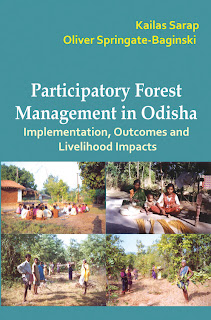Participatory Forest Management in Odisha: Implementation, Outcomes and Livelihood Impacts by Kailas Sarap, Oliver Springate-Baginski
Publication Year 2013
ISBN-13 9789380574387
Language English
Binding Hardcover
Number of Pages 240 Pages
Price : Rs. 695.00
About the Book
Based on original survey data and other source materials, this study analyses the functioning of participatory forest management (PFM) in Orissa, both due to the local people's own initiatives and through the state supported JFM programme and their impact on the livelihood.
The working of the PFM has not been satisfactory due to poor governance, weak local institutions, lack of effective participation of women and the poor, unequal product distribution, lower access to forest resource. Lack of robust intra and inter village conflicts management among different stakeholders has weakened proper management of resources; created problems in benefit sharing, usufruct rights, and boundary disputes over the forest area. A number factors — low literacy and awareness of the forest related policies among the primary stakeholders, high dependence of poor on traders and others for land and credit, low bargaining power of women within PFM institutions, and the presence of forest mafias —have contributed to it.
PFM has led to improved forest condition, and increased access to a variety of forest products for the households. But improvement in the livelihood conditions of participant households has been marginal due to a number of factors including no value addition to collected products, marginal improvement in market relation for NTFP sale, high dependence on informal loan at onerous terms and conditions and low level of human capital development. PFM has raised the expectation of members, and now it has to improve the economic conditions of the poor.
The authors have suggested a number of policies including-democratization of Forest Protection Committees, assured tennurial rights to the local communities, recognition of multiple participatory management practices including JFM and Community Forest Management, recognition of forest based subsistence use, promotion of value addition and forest based enterprises, improvement of marketing networks through collaboration with other local institutions, increased investment in forest sector and effective coordination with other stakeholders.
The book will be of interest to all those who have interest in Environment and Natural Resource Economics and Forest policies.
About the Author
Kailas Sarap is a former Professor of Economics at Sambalpur University, Sambalpur, Odisha and has been a visiting fellow at the University of Namur, Belgium, and Common Wealth Fellow at the University of Oxford. He has written extensively, in international and national research journals, including the Journal of Peasant Studies; the Cambridge Journal of Economics, Development and Change, Economic and Political Weekly and Indian Economic Review and two books entitled “Interlinked Agrarian Markets in Rural India”,and “Institutions, Livelihood and Natural Resource Management”. His research interests include Agrarian Relations, Agrarian Markets and Natural Resources Goverance.
Kailas Sarap is a former Professor of Economics at Sambalpur University, Sambalpur, Odisha and has been a visiting fellow at the University of Namur, Belgium, and Common Wealth Fellow at the University of Oxford. He has written extensively, in international and national research journals, including the Journal of Peasant Studies; the Cambridge Journal of Economics, Development and Change, Economic and Political Weekly and Indian Economic Review and two books entitled “Interlinked Agrarian Markets in Rural India”,and “Institutions, Livelihood and Natural Resource Management”. His research interests include Agrarian Relations, Agrarian Markets and Natural Resources Goverance.
Oliver Springate-Baginski is Lecturer, School of Development Studies, University of East Anglia, UK and Senior Research Fellow in the Overseas Development Group. His research interests focus on forest and other natural resource governance reform and also its relationship with equitable livelihood development and biodiversity. Recent work has involved managing multi-disciplinary policy-oriented projects focused on forest landscapes in South Asia.

No comments:
Post a Comment